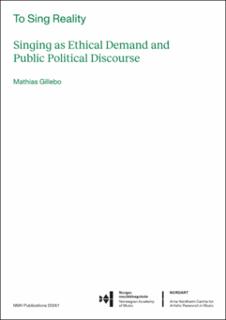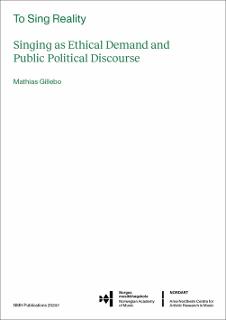| dc.contributor.author | Gillebo, Mathias | |
| dc.date.accessioned | 2024-01-23T10:45:42Z | |
| dc.date.available | 2024-01-23T10:45:42Z | |
| dc.date.issued | 2024 | |
| dc.identifier.isbn | 978-82-7853-334-5 (print) | |
| dc.identifier.isbn | 978-82-7853-335-2 (pdf) | |
| dc.identifier.issn | 0333-3760 | |
| dc.identifier.issn | 2535-373X (online) | |
| dc.identifier.uri | https://hdl.handle.net/11250/3113298 | |
| dc.description | Dissertation for the PhD degree Norwegian Academy of Music, Oslo 2024 - Avhandling (Ph.D.) - Norges musikkhøgskole, Oslo 2024 | en_US |
| dc.description.abstract | Sammendrag. -
Denne avhandlingen utforsker etiske og politiske implikasjoner ved å synge. Jeg tar utgangspunkt i erfaringen av at noe prekært skjer når jeg synger: at noe står på spill, at noe blir både etablert, destabilisert og konstituert, samtidig, og som fordrer noe av meg – en virkelighet jeg er nedsenket i, adresserer og endrer gjennom stemmebruk. Jeg utforsker dette prekære i utøvelsen i lys av det overordnede forskningsspørsmålet: Hva er de etiske og politiske implikasjonene i sang?
Avhandlingen består av fem kapitler:
Det første kapitlet introduserer hovedtemaene – sang, etikk og politikk – og presenterer et utvalg av sentrale eksisterende perspektiv (Platon, Aristoteles, Adorno, Goehr, Street), konsertene i prosjektet, hypotesene og forskningsspørsmålene.
Det andre kapitlet er en teoretisk kontekstualisering av avhandlingen. Først i lys av den performative vendingen i kvalitativ og kunstbasert forskning (Schechner, Small, Fischer-Lichte, Borgdorff, Crispin), så gjennom en presentasjon og vurdering av det teoretiske rammeverket som jeg utforsker min egen sangutøvelse gjennom: etikk (Løgstrup, Jonas), offentlighetsteori (Habermas, Rancière, Goehr, Street) og semiotikk (Kristeva, Barthes, Adorno, Rolvsjord).
Det tredje kapitlet er en metodologisk kontekstualisering av avhandlingen. Først posisjonerer jeg avhandlingen i relasjon til pågående diskusjoner om forskning basert på kunst og artistic research (Leavy, Borgdorff, Crispin, Daykin, Kirkkopelto). Deretter drøfter jeg case study som måte å nærme meg min egen sangutøvelse på (Flyvbjerg). Til slutt presenteres de tre konsertproduksjonene som utgjør studiens cases – Weihnachtsoratorium av J.S. Bach, en operakonsert med standard operarepertoar av G.F. Händel, W.A. Mozart og R. Wagner, og Kindertotenlieder by G. Mahler – i tillegg til en presentasjon av gruppeintervjuene, diskusjon av forskningsetikk og et sammendrag av analyseprosessen.
Det fjerde kapitlet består av analysen av konsertene og de fem intervjuene av gruppene som var til stede i publikum.
Diskusjonen i det femte kapitlet er en videreutvikling av analysen gjennom drøfting av hva etisk fordring og den offentlige sfære kan bety i forbindelse med sang. Det korte svaret er at sang eksponerer sangerens og publikums felles menneskelighet og grunnvilkår. På grunnlag av analysen av tre hovedkategorier som knyttes til det teoretiske rammeverket, diskuterer jeg hvordan den pågående overgangen mellom lyd og ord skjer som etisk fordring og deltakelse i offentlig politisk diskurs, og konstituerer subjekt og mening gjennom sangens destabilisering og re-etablering av symbolsk virkelighet.
Hovedhensikten med avhandlingen har vært å utforske etiske og politiske implikasjoner i sanghandlingen. Tydeliggjøringen av utøvers og publikums felles menneskelighet gjennom sanghendelsens interaksjon, kan bidra til en teoretisk og metodologisk legitimering av sang som deltakelse i etisk-politisk diskurs i det offentlige rom, utvide tradisjonelle måter å forstå hva slik deltakelse kan være, og gi grunnlag for en forståelse av kunstnerisk ekspertise der bevissthet om denne deltakelsen er grunnleggende for praksisen. | en_US |
| dc.description.abstract | Summary. -
This thesis explores the nature and extent of the ethical and political implications of the act of singing. I take as a point of departure the experience of urgency when singing: the experience that something is at stake, that something is at once established, destroyed and constituted, and demands something of me – a reality which I am immersed in, address and change through the use of voice. I explore this performative urgency by asking the overarching research question: What are the ethical and political implications of singing?
The thesis is presented in five chapters:
The first serves as an introduction to the main topics – singing, ethics and politics – presenting a selection of key existing perspectives (Plato, Aristotle, Adorno, Goehr, Street), the music performances of the study, the hypotheses and the research questions. The second provides a theoretical contextualization of the study, first concerning the performative turn in the humanities and performance practice (Schechner, Small, Fischer-Lichte, Borgdorff, Crispin), followed by a presentation and assessment of the theoretical framework and concepts with which I explore my own singing performance: ethics (Løgstrup, Jonas), the public sphere (Habermas, Rancière, Goehr, Street) and semiotics (Kristeva, Barthes, Adorno, Rolvsjord). The third chapter provides a methodological contextualization of the study in relation to current discussions of arts-based research and artistic research (Leavy, Borgdorff, Crispin, Daykin, Kirkkopelto), followed by an assessment of case study as an approach to my own singing performance (Flyvbjerg). Finally, the chapter presents the three concert productions that constitute the cases of the study – Weihnachtsoratorium by J. S. Bach, an opera recital with mainstream opera repertoire by G. F. Händel, W. A. Mozart and R. Wagner, and Kindertotenlieder by G. Mahler – as well as a presentation of the group interviews, discussions concerning research ethics and an overview of the process of analysis. The fourth chapter provides the analysis of the concerts and the five interviews of two groups attending them.
The discussion in the fifth chapter assesses what ethical responsibility and the public sphere mean in relation to singing. The short answer is that singing exposes the shared humanity of singer and audience. Based on an analysis of three main categories pertaining to the presented interpretive framework, I discuss how the ongoing transition between sound and word manifests as both ethical demand and public political discourse, constituting subject and meaning. The main objective of the thesis is the exploration of the ethical and political implications of the act of singing. The exposure of the shared humanity of performer and audience inherent in singing can contribute to the theoretical and methodological legitimation of singing as participation in ethical-political discourse in the public sphere, widening conventional views concerning what constitutes such participation and suggesting a notion of artistic expertise in which the awareness of such a participation is integral to artistic practice. | en_US |
| dc.language.iso | eng | en_US |
| dc.publisher | Norges musikkhøgskole | en_US |
| dc.relation.ispartofseries | NMH-publikasjoner;2024:1 | |
| dc.subject | performance practice | en_US |
| dc.subject | audience | en_US |
| dc.subject | public sphere | en_US |
| dc.subject | arts based research | en_US |
| dc.subject | artistic research | en_US |
| dc.subject | singing | en_US |
| dc.title | To sing reality. Singing as ethical demand and public political discourse | en_US |
| dc.type | Doctoral thesis | en_US |
| dc.description.version | publishedVersion | en_US |
| dc.subject.nsi | VDP::Humaniora: 000::Musikkvitenskap: 110::Annen musikkvitenskap: 119 | en_US |
| dc.source.pagenumber | xvi, 320 sider | en_US |

